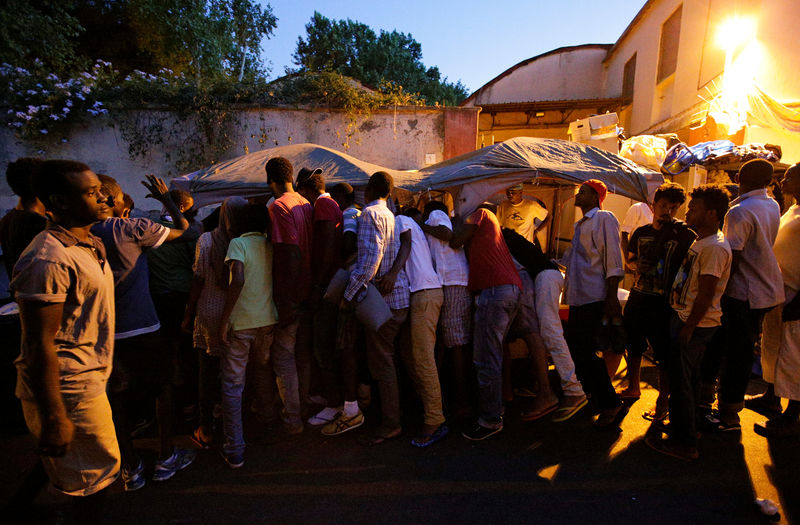
By Michelle Martin and Humeyra Pamuk
BERLIN/ISTANBUL (Reuters) – Turkey could walk away from its promise to stem the flow of illegal migrants to Europe if the European Union fails to grant Turks visa-free travel to the bloc in October, Foreign Minister Mevlut Cavusoglu told a German newspaper.
His comments in Bild’s Monday edition coincide with rising tension between Ankara and the West following the July 15 failed coup attempt. Turkey is incensed by what it sees as an insensitive response from Western allies to the failed putsch in which 240 people, many of them civilians, were killed.
Europe and the United States have been worried by the crackdown following the coup. Some Western governments are concerned this could affect stability in the NATO member and suspect that President Tayyip Erdogan is using the purges as an excuse to quash dissent.
Asked whether hundreds of thousands of refugees in Turkey would head to Europe if the EU did not grant Turks visa freedom from October, Cavusoglu told Bild: “I don’t want to talk about the worst case scenario – talks with the EU are continuing but it’s clear that we either apply all treaties at the same time or we put them all aside.”
Visa-free access to the EU – the main reward for Ankara’s collaboration in choking off an influx of migrants into Europe – has been subject to delays due to a dispute over Turkish anti-terrorism legislation, as well as Ankara’s crackdown.
Brussels wants Turkey to soften the anti-terrorism law, which Ankara says it cannot change, given multiple security threats which include Islamic State militants in neighboring Syria and Kurdish militants in its mainly Kurdish southeast.
European Commissioner Guenther Oettinger has said he does not see the EU granting Turks visa-free travel this year due to Ankara’s crackdown after the failed military coup.
Cavusoglu said treaties laid out that all Turks would get visa freedom in October, adding: “It can’t be that we implement everything that is good for the EU but that Turkey gets nothing in return.”
A spokesman for the European Commission declined to comment on the interview directly but said the EU continued to work together with Turkey in all areas of cooperation.
THOUSANDS DETAINED
Selim Yenel, Turkey’s ambassador to the EU, said last week that efforts were continuing to find a compromise with the EU on visa liberalization and he thought it would be possible to handle this in 2016.
Since the coup, more than 35,000 people have been detained, of whom 17,000 have been placed under formal arrest, and tens of thousands more suspended. Turkish authorities blame the failed putsch on U.S.-based Muslim cleric Fethullah Gulen and his followers.
Amid rising tension with the West, Turkey has sought to normalize relations with Russia, sparking fears in the West that Erdogan and Russian President Vladimir Putin might use a rapprochement to exert pressure on Washington and the EU and stir tensions within NATO.
Asked if Turkey would leave NATO, Cavusoglu told Bild that while Turkey remained one of the biggest supporters of the 28-nation Western alliance, it was also looking at other options.
“But it’s clear that we also need to cooperate with other partners on buying and selling weapon systems because some NATO partners refuse to allow us to sell air defense systems for example or to exchange information,” he said.
Over the weekend, Turkey summoned Austria’s charge d’affaires in Ankara over what it said it was an “indecent report” about Turkey on a news ticker at Vienna airport.
“Turkey allows sex with children under the age of 15,” read a headline on an electronic news ticker at the airport, images circulated on social media showed.
In a statement, Turkey’s foreign ministry said it was “regrettable” that an international airport at the heart of Europe was used as “a tool … in spreading such irresponsible, twisted and inaccurate messages”.
It said the publication of such “slandering” news reports were encouraged by recent comments from Austrian politicians.
Cavusoglu this month referred to Austria as the “capital of radical racism” after Austrian Chancellor Christian Kern suggested ending EU accession talks with Turkey.
(Additional reporting by Julia Fioretti in Brussels; writing by David Dolan; Editing by Paul Carrel and Richard Balmforth)











